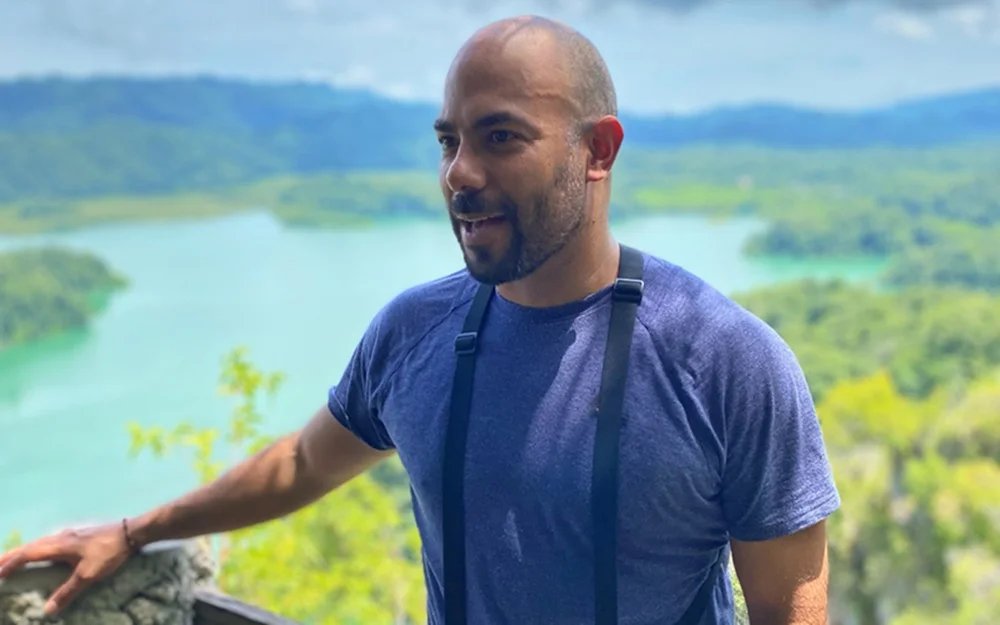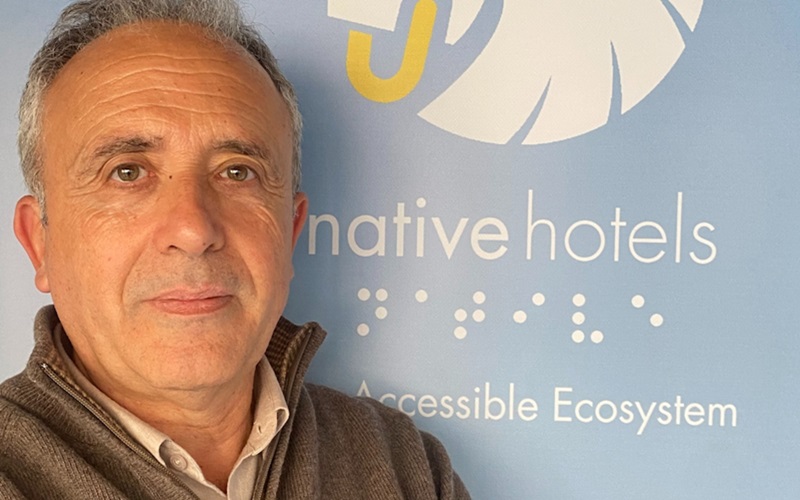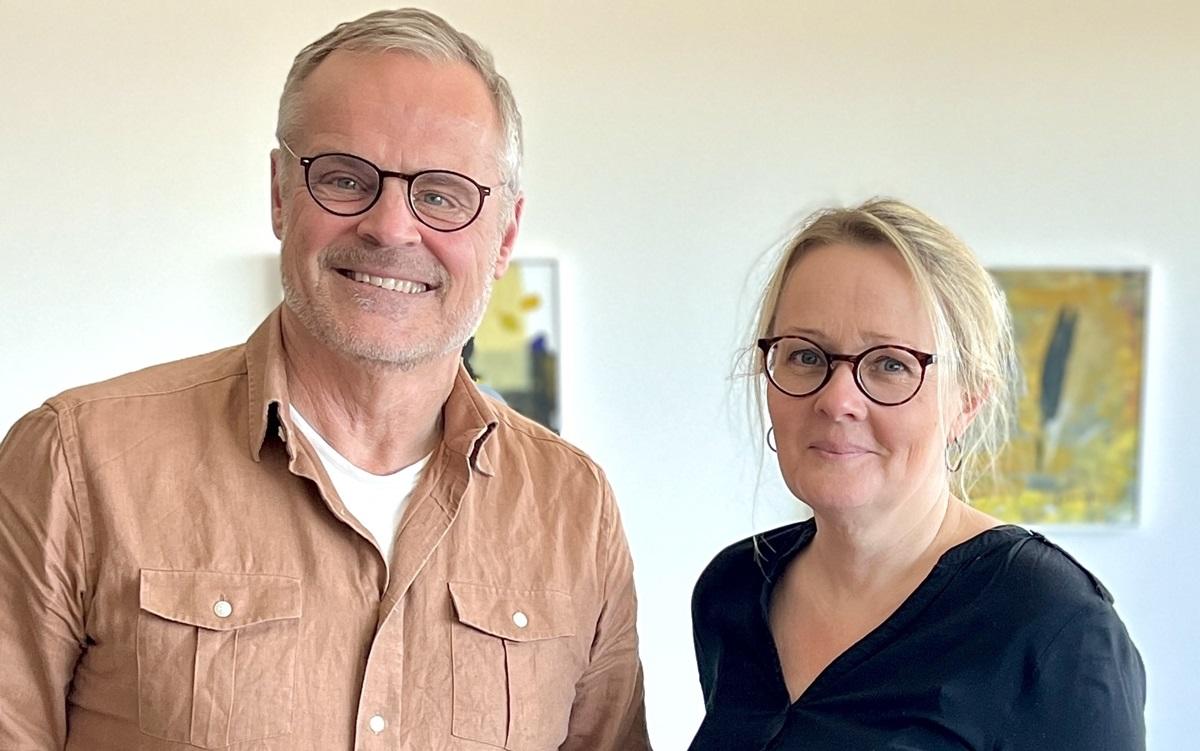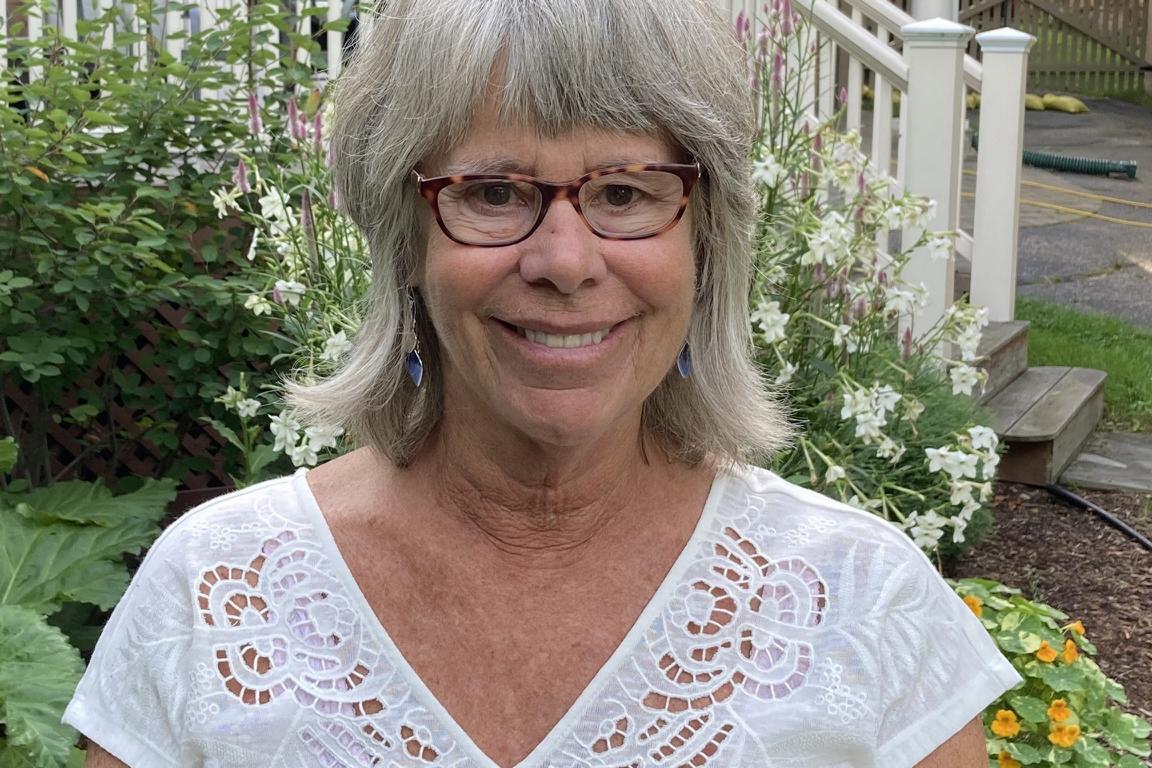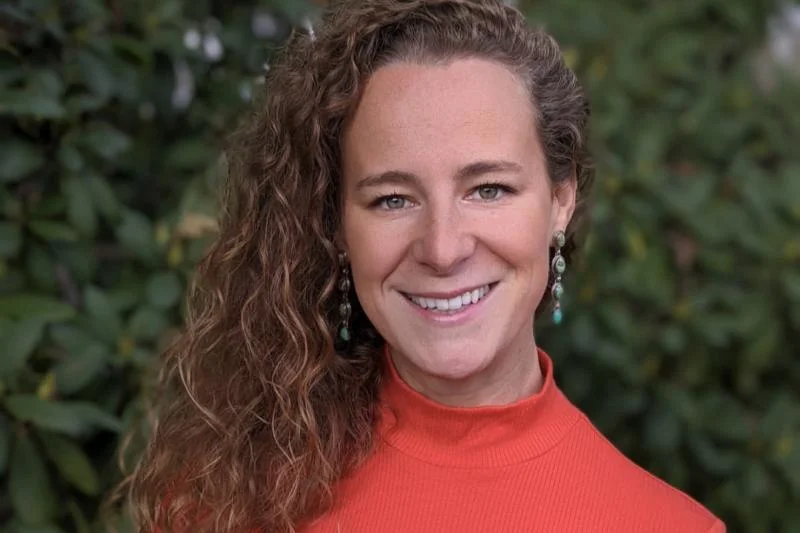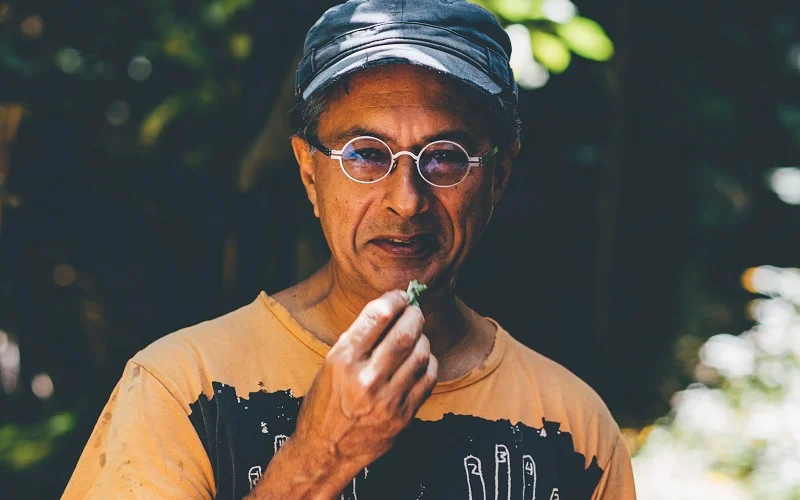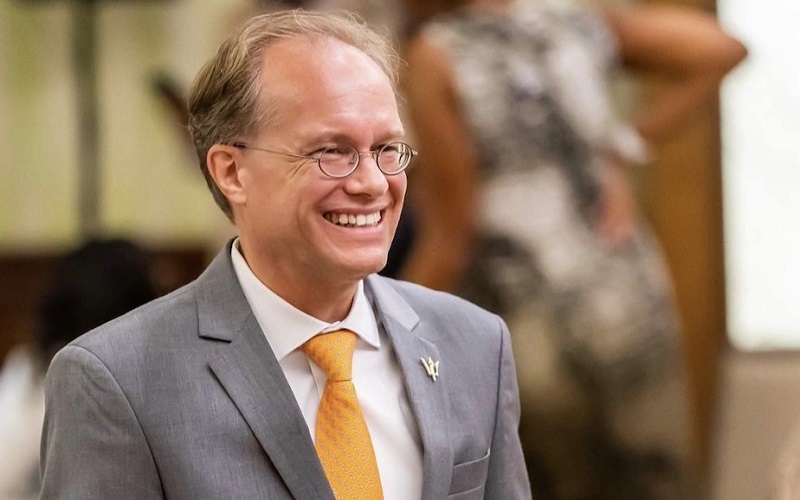
Dr. Jens Thraenhart is a visionary in sustainable tourism, having spearheaded initiatives that have transformed the way the world thinks about responsible travel. His innovative approach to responsible travel development and destination brand storytelling has earned him a reputation as one of the most influential voices in the industry.
Having recently joined Barbados Tourism Marketing Inc. as CEO, Dr. Thraenhart in this interview, shares his experience of working with the Caribbean island. And he presents the Be Bajan concept, a smart combination of place brand development and community-centered, authentic travel promotion.
Join us as we catch up with Jens to explore his vision for the island state and how he’s driving sustainable tourism in Barbados. The interview is part of our sustainability spotlight series on Barbados, in which we showcase the destination’s vision, action and changemakers.
Jens, you have gained a wealth of experience throughout your professional career as a business manager, author and advisor. What motivated you to work for Barbados Tourism as the CEO?
Thank you for having me. I have always been fascinated by tourism and the opportunities it offers. I was motivated to work for Barbados Tourism as the CEO for various reasons. Barbados is a very diverse destination, offering much more than just beaches, but everything from its rich history, culture, heritage, culinary, sports, and diverse tourism offerings.
Barbados has tremendous potential to create a new destination management model with the necessary political capital support. Making sustainability and inclusivity the core pillar of a balanced tourism recovery, the destination has the unique opportunity to bring in communities and stretch the tourism dollar so the leakage factor can be reduced, and more money stays I the destination – benefiting more than just a few select.
This strategic opportunity is aligned with the narrative of the Prime Minister, Hon. Mia Mottley, advocating for climate resilience on global UN platforms.
All these pieces coming together provided a unique chance for me to realize an opportunity to truly transform tourism as a force for good. Realizing the sensitivities of bringing in a foreigner to lead the most important economic sector of the country and island politics having the potential to disrupt progress and change, I thought that the opportunity is too great not to give it a shot.
When did you first hear about Barbados – what were your initial thoughts?
I visited Barbados over 15 years ago when working for Fairmont Hotels & Resorts for an owner’s meeting connected with Fairmont’s Heritage Place vacation ownership product. It was a fairly short and quick visit, but I was very impressed with the beauty of the island, the friendliness of the people, and the culinary offerings.
I never realized then that I would be heading up tourism for the island 15 years later, especially relocating from Bangkok, Thailand, literally on the other side of the world.
Reflecting on the last few years, what has been the most significant change, or development, in your view – linked to how destinations (can) develop and manage their brand?
Many destinations have learned the hard way that endless upward growth is simply not sustainable. Over-tourism, or better over-crowding, has been just one negative result of mass tourism marketing.
It’s time for us to rethink traditional marketing metrics like doubling international arrivals and increasing the number of heads in beds.
From environmental degradation and mis-management to pollution, increased cost of living, traffic, and poor quality of life for local residents, destinations are finally catching on to the shift from destination marketing to destination management.
While proactive Experience Development as part of stakeholder engagement is key, Marketing and Branding also have an important part to play by identifying stories and experiences that support your destination goals and aim to alleviate some of the problems destinations are facing.
Sustainable tourism marketing through storytelling is the most ethical approach, promoting authentic stories and real people that can positively affect local communities and businesses.
I am a big proponent of what I call micro-community and niche marketing. Many micro-communities, while small, are extremely loyal and passionate. Communities of birdwatchers, underwater dive photographers, rum connoisseurs, star-gazers, horticulturalists, kite surfers, or plant photographers, to give a few examples, follow each other, and promote destinations within their tribes.
Understanding which experiences are attracting the highest volume of conversation and positive sentiment is crucial for effective content marketing and experience promotion. Sentiment Analysis can also help to stimulate new travel segments in a cost-effective manner.
This insight is also key to identifying and engaging with key opinion leaders and influencers, as well as online communities within the respective communities. And by linking to the sustainability goals of the destination, we can also develop slow travelers that stay longer and spend more, as well as reduce the carbon footprint.
According to Tourism Sentiment Index (TSI), Barbados is ranked 1st in the Caribbean and 9th in the world for nature photography. This insight could open up some great opportunities to position Barbados as a nature destination and create a campaign with a top camera brand (ex. Leica, Canon, Nikon, etc.) to tap into their loyal audience.
The niche approach is a strategic way for destinations to address specific issues, such as increasing visitation during the off-season, while ensuring that marketing efforts are targeted and effective. Instead of reaching a mass audience, destinations can choose to be a big fish in a small pond by focusing on niche markets where they can excel and provide the most value to both visitors and the tourism industry.
By authentically engaging with people who are already passionate about certain experiences, destinations can cut through the noise and create meaningful connections. This can be achieved through social advertising, search engine marketing, programmatic and targeted content distribution, and leveraging the power of online influencers and advocates.
When residents, expats, tourism businesses, past travelers, and online influencers become enthusiastic fans, they can generate valuable content that promotes the destination and generates positive word of mouth.
Consumer engagement is a more valuable metric than reach, as it is centered around people’s interests and passions. Destinations can leverage specialized content, such as helpful itineraries, to raise awareness and build trust within niche audiences.
The internet has made it easier for passionate micro-communities to gather online across borders, allowing for interest-based segmentation, sentiment analysis, and identification of key opinion leaders and influencers. This information can inform marketing strategies, content development, and even the selection of hero experiences for creative campaigns.
In conclusion, the niche approach allows destinations to connect with passionate communities, create meaningful engagement, and achieve tangible results while being mindful of sustainability. By focusing on specific niches and leveraging the power of online influencers and advocates, destinations can effectively promote their offerings and generate positive word of mouth, leading to increased visitation and success in the competitive tourism industry.
Barbados in its brand communications focuses on climate stewardship and responsible tourism, which contrast its prevailing image of a laid-back Caribbean nation and a sand and sea destination. How has the response been from travel businesses or visitors so far?
The threat of climate change poses a significant challenge to Barbados’ tourism industry. To protect and preserve our natural assets and ensure the future growth of tourism, action must be taken today.
Embracing responsible tourism and events is crucial in making Barbados a better place to live and visit, as visitors are increasingly mindful of their social and environmental impacts.
Public-private partnerships will be essential in addressing these challenges. Local authorities will need specialized data on per-tourist usage of resources and energy to justify funding for new infrastructure. Collaborative efforts between the government and the private sector can be the first step in gathering necessary data, such as energy and water usage per tourist, which can then be shared with private-sector associations.
One of the key benefits of this collaboration is that the private sector will have access to accurate information about their internal costs as well as the actual costs of the tourism destination’s infrastructure. This can help the public sector design attractive public-private finance structures.
There is a unique opportunity for businesses to make sustainable choices easier for visitors so that responsible tourism becomes the norm rather than something they have to seek out. Tackling climate change can not only reduce long-term costs and build resilience for the industry but also meet the increasing consumer demand for responsible and sustainable businesses.
Despite the challenges, it is encouraging to see many in the industry showing commitment to improving sustainability and prioritizing responsible tourism. Taking action now and embracing sustainability will be crucial for the future success of Barbados’ tourism industry, protecting our natural assets and preserving them for future generations.
In only a year after starting our Sustainable Tourism Journey, we were recognized by Green Destinations as the 2023 global winner in the Climate Change and Environment category.
Sustainability is an important success indicator now for any destination. How do you master this balancing act between wanting more attention and visitors (who will mostly fly to Barbados or take a cruise liner), and at the same time having to protect the natural environment and ensure the well-being of local communities?
Barbados seeks to establish a way of developing business for tourism that ensures we are creating a future for our citizens by managing and protecting our most precious assets, focusing on three pillars:
(1) environmental management (low carbon and biodiversity),
(2) social Inclusion (local tangible and intangible heritage), and
(3) economic balance (inclusive growth, inward investment, gender equality and job creation).
These assets, including our culture, environment, and our land will be ever more essential to our future.
And we seek to secure this by financing for adaptation and green infrastructure to protect our industry and our island, focusing on the 17 SDGs, including issues such as climate change, single use plastic, and food waste.
We cannot wait for the slow process of change that is now on-going for global sustainability, and we must make preparations for climate impacts.
The tourism industry in Barbados is over 30% of our GDP, and we therefore must work to protect our livelihoods and develop systematic ways to protect our future, with assets we can depend on. It is our social and environmental assets that make us who we are, and also who we want to be. They are not separate from our economy.
We can protect our culture, and our coral reefs, make preparations for sea level rise, and we must invest in our local citizens’ ability to provide unique and sustainable services to our visitors. We will facilitate the industry’s role in creating the financial instruments that will finance our future through green sustainable methods and renewable energy.
Simply, we must sustain employment, manage our resources sustainably, and foster a tourism economy that covers the cost of the social and environmental assets upon which tourism depends, considering that.
Small island developing states (SIDS), such as Barbados, need to promote sustainable tourism initiatives, such as offering ecotourism and sustainable activities – snorkeling and diving tours, nature walks, birdwatching, and visits to eco-lodges. This helps to keep the local environment and ecosystems healthy, create a low-carbon tourism industry, and minimize the environmental impact of tourism activities.
It is critical to protect local cultures and ecosystems, which helps to protect the environment and promote cultural diversity. Local communities need to be included in the decision-making process to ensure that their needs are taken into consideration.
Linking the local agriculture and aquaculture sectors to tourism is an effective way of making the tourism sector more economically inclusive and viable in the long term. Increasing the awareness of using local produce through activities such as Slow Food Barbados will increase demand by residents and visitors to experiences that source locally. Recognizing businesses and sourcing locally and local suppliers will enhance this.
Finally, training the tourism industry personnel in sustainability can help ensure that tourism activities are conducted in a sustainable manner. This includes educating tourists about responsible tourism practices, as well as training tourism personnel to recognize and reduce the environmental impacts of their activities.
What suggestions do you have for other regions or countries that are renewing their brand and marketing efforts as we all try to finally get hold of the climate crisis?
Tourism destination management has significant importance in controlling many impacts of tourism, as well as ensuring the sector’s success, thus ensuring its sustainability.
Effective management of tourism destinations is crucial in mitigating the negative impacts of tourism and ensuring the long-term success and sustainability of the industry.
Sustainable tourism destination management emerged as a response to the need for developing tourism destinations in a sustainable way, recognizing the potential benefits of well-managed destinations. Conversely, poor management can have severe consequences, including environmental degradation, economic instability, overconsumption of resources, and loss of cultural identity and integrity.
Creating resilience in tourism destinations is the key to achieving sustainability. Without resilience, all the progress made toward sustainability can be lost in a single disaster.
Therefore, it is imperative to prioritize resilience when aiming for sustainable tourism destinations. This involves reframing the values and business models of the destination to be more holistic, involving a diverse range of stakeholders in the journey towards resilience, and identifying the capacities that need strengthening in the destination to build resilience. For example, protecting coastlines and preserving natural capital such as coral reefs must be a top priority for Barbados to build resilience.
Tourism is about people, and it is vital to engage local communities and stakeholders to support sustainable tourism practices. Creating an environment that facilitates and supports the involvement of local people in the process is crucial.
Micro-, small-, and medium-sized businesses, as well as individuals, shape the destination and provide unique experiences to visitors and residents, making a significant cultural impact that reflects the island’s culture and heritage. Enabling these authentic experiences will allow them to become valuable members of their communities, grow, make an impact, and recognize their achievements. In doing so, they will represent the heart of Bajan culture and experiences and the island will be repositioned from being solely known as a beach destination.
Barbados is a seasonal destination, yet the biggest opportunity for growth, as well as sustainability, is seasonal dispersion and inclusivity. What is your personal vision to create and execute a marketing strategy that can transform the island, and create value for all residents, and not just a few?
Research shows that beach destinations in the Caribbean are not significantly differentiated from each other and are viewed as “commoditized” experiences, allowing intermediaries and packagers to use price as the main attraction for visitors. As mentioned above, our goal needs to be to position Barbados from “beach-only” to “more than just beaches.”
In their book “Blue Ocean Strategy,” published in 2005, Renée Mauborgne and W. Chan Kim argue that traditional head-to-head competition in crowded industries often leads to a red ocean of fierce rivalry over shrinking profits. Instead, they propose a strategy of creating blue oceans – untapped market spaces where demand can be created rather than fought over. This strategy involves pursuing differentiation and low cost simultaneously in uncontested markets. In the context of tourism marketing, the industry often resembles a crowded red ocean, with a few dominant players and intense competition among all others.
Moreover, destination marketers tend to adopt a red ocean mindset, focusing on price, place, and promotion to beat the competition. They prioritize changing business propositions instead of improving value propositions. In times of crisis, this mindset may be reinforced when tourism is seen as a quick solution for short-term profit. However, unchecked tourism growth can have negative impacts on the environment, historical sites, and local communities. Proper visitor management is crucial to avoid these risks and ensure sustainable revenue for destinations.
Therefore, destinations cannot be treated as mere commodities by destination marketing organizations (DMOs). Reducing goals to selling high volumes of visitors or increasing occupancy rates may lead to a decline in the quality of experience and reputation for both the destination and the tourism industry as a whole.
It is imperative to adopt a more strategic and sustainable approach to destination management, focusing on creating unique value propositions and ensuring a positive impact on the environment, society, and culture of the destination.
However, being an island, protecting existing and getting new airlift is critical for all the obvious reasons.
In order to make sustainability work and to promote local businesses, scale is key. Especially now post COVID, balanced and measured tourism growth is essential. The challenge is that we have to plan now and cannot fall into the trap of attracting more tourists than the destination can handle without losing the appeal of the destination and disrupting the ecosystem.
The Ministry of Tourism and International Transport of Barbados commissioned a Carrying Capacity Study with the University of the West Indies to plan destination management and capacity issues.
The key growth area is dispersion, both geographic dispersion to have visitors explore less touristy spots on the island and connect with communities, as well as seasonal dispersion to make Barbados a year-round tourism destination. The goal is to position the current low season as great value as well as exciting due to the various festivals and events taking place during the summer months. This can be achieved by creating a large online content cloud by encouraging visitors and residents to share their own experiences on social media to inspire people from all over the world.
Barbados stands out for its absence of “tourism zones,” naturally integrating residents with visitors. As a single island, it has a unique opportunity to deliver messaging to a relatively static population, encouraging residents to “act independently but in a coordinated way.”
Our vision needs to be to develop authentic and inclusive tourism products that benefit locals and visitors alike. This will be done through product development and storytelling, targeting new niches to reduce seasonality and dependence on current traveler segments. This will result in re-positioning the island from “beach-only” and, as such, creating a “blue ocean strategy” to avoid competing with the messaging with islands that don’t have much more to offer than just beautiful beaches.
Stakeholder engagement and relations are crucial, and we will incentivize businesses and individuals to promote local experiences reflecting Bajan values. Our goal is to turn everyone into an advocate for Barbados.
 How do you envision promoting authentically local experiences to drive inclusive growth and connect both residents and visitors with communities to showcase culture in Barbados?
How do you envision promoting authentically local experiences to drive inclusive growth and connect both residents and visitors with communities to showcase culture in Barbados?
Barbados is shaped by many micro-, small- and medium-sized businesses, which provide experiences to residents and visitors alike and have a significant cultural influence as identification for Barbados’ culture and heritage.
Being one of only ten destinations featured in the global documentary series “Sustainable Travel – Where Next,” we showcased small, responsible travel businesses. These authentic experiences, which build the public image of Barbados as a tourism destination, have to be enabled to be valuable members of their communities by allowing them to grow, make an impact, and recognize their achievements.
A proposed concept is the Bajan Treasurers Collection (BTC) as a collaborative curation of authentic Bajan experiences, which exemplify product, service, and business standards and contribute to showcasing Barbados as a sustainable and experiential destination with high-quality, authentic experiences, festivals, showcasing the richness of the Bajan culture.
Working close with BTC members will also support storytelling initiatives to tell authentic stories about Barbados. By showcasing authentic local experiences, we can effectively communicate experiences that are most relevant to our target customers.
It will be designed to become a key driver to creating a tourism community on the island, increase the local tourism value chain, and provides mechanics to engage stakeholders and support sustainable tourism development by building a community of like-minded stakeholders representing Barbados and its culture. It is championing an inclusive and sustainable tourism industry.
To make the Bajan Treasures Collection successful, it is essential to generate value for all stakeholders to engage with them and collaborate in activities to build capacity, foster innovation, promote the destination, and thus increase the impact of programs.
The Bajan Treasures Collection will, if successful, become a storytelling platform to increase the exposure of authentic Bajan experiences and position Barbados as a destination with more than just beaches with a variety of unique and rewarding experiences linked to the passions of visitors and residents alike.
Consumer-generated visual content has been shown to have the highest impact on telling these authentic stories, and the Bajan Treasures Collection will use collaborative marketing to encourage each member’s business to engage their respective consumers to share their experiences online.
You mention the term “Bajan” above as a concept you want to explore. While “Bajan” is a colloquial expression for “Barbadian,” could you briefly explain what it means in the context of differentiating Barbados from other destinations?
“Be Bajan” is a campaign designed to celebrate Barbados’ unique identity and culture, creating a sense of pride among locals and sharing that pride with visitors.
The campaign aims to connect people of all types with Barbados in a more meaningful way, serving as a bridge between locals’ pride and visitors’ experiences.
Issues such as sustainability, varied experiences, and cultural “depth” are important for destination brands that want to succeed in the long term.
The strategy behind “Be Bajan” is based on the concept of localhood, which supports the inclusive co-creation of a future destination where human relationships are the focal point, and locals and visitors interact around shared experiences. The goal is to build tourism growth responsibly across industries and geographies, with localhood as the shared identity and common starting point.
The most challenging aspect of the campaign will be to ensure that it stays authentic and true to Barbados’ culture and identity, without becoming too commercial.
If successful, “Be Bajan” could position Barbados as the world’s most stakeholder-centric destination, creating an aspiration to “Belong”. The campaign aims to put travelers and locals at the core, leading with empathy and relevance, to build trust and confidence and drive visitation to Barbados.
An innovative incentive scheme may drive engagement to turn anybody part of the “be Bajan” community into a “Barbados Promoter” from residents to visitors to the diaspora by encouraging people to share experiences online, become an affiliate to invite friends and family to visit Barbados, to promote sustainable living and responsible practices, aligned to the “be Bajan” mindset.
The brand essence of what it means to “be Bajan” is a mindset built by the people, with a focus on being welcoming, respectful, environmentally conscious, caring for the community, and enjoying life.
As Barbados-born celebrity Rihanna mentioned in her speech when Barbados became a republic just recently, “I will be Bajan for the rest of my life.”
Thank you, Jens.
More about Dr. Thraenhart’s expertise, experience and services in his Sustainability Leaders profile or on his website. Connect and engage with him on LinkedIn, Twitter or Facebook.
Want more on Barbados? Visit our Barbados sustainable tourism showcase!


